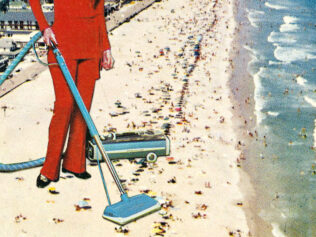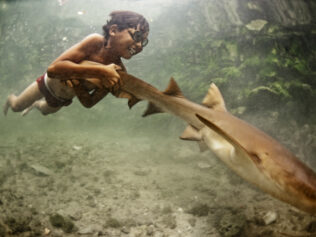
One can turn the whole world upside down by sitting motionlessly. It was already done once by a frail old man, wrapped in cotton. Let’s hope that delicate teenage girls can do it, too.
Yet another dry, hot day. I wake up tired, not at all refreshed by the cold night’s air. Mainly because it didn’t get any cooler. I go for an early walk with my dog. Instead of wading in the dewy grass and collecting cold water drops on his snout, he has to force his way through the stiff, yellowed stalks. The dust scratches his throat. He sneezes and goes looking for some relief in the city fountain. The animal stands in the greenish water, panting heavily, right next to a faded sign: Do not enter the water.
The ban is void this season – everyone goes in. Dogs and children wade in the water, adults sit on the brim, soaking their feet. Two gardeners who look after the area just wave their hands dismissively and walk to and fro with watering cans, trying to keep alive the flowers they have planted in the spring. Dry, balding grass is strewn with empty ice-lolly packets and plastic water bottles. Nobody is cleaning up after themselves, nobody has the energy to take three steps to the bin.
Is this what the end of the world looks like? I think, looking around my own yard, once a well-maintained urban garden, now slowly morphing into a small landscape of a crawling climate dystopia. Greta Thunberg would beg to differ – not crawling but galloping. This catastrophic movie, in which my dog, myself, and seven billion people are barely the extras, is not following a linear screenplay. The plot will not develop gradually – all markers are already breaking all existing measures. Nobody knows what’s going to happen in the next scene. A catastrophe – yes, that’s for sure, but its scale, violence and severity are beyond imagining. Nothing like this has ever happened to us before.
We know all this, but we keep on living more or less how we used to. As often happens at the cinema, some lone protagonist is trying to stop the apocalypse. Meanwhile, crowds of extras, ignorant and indifferent, walk about, minding their own business. The show goes on, straight toward the cliff’s edge. We just buy more water in giant 15-litre bottles and huge bags of ice. We install air-con units in our homes and cool down in our cars with the windows closed. Even though all this just pushes us even closer to our end.
There is just one thing that was not predicted by any film studio; neither by Hollywood, nor by Bollywood or Nollywood. Our superheroes won’t be ripped, Tom Cruise-like men, but compassionate teenage girls with carefully plaited pigtails.
These superheroes – such as the famous Greta from Sweden and her Polish follower, 13-year-old Inga, who sat under the Polish parliament building on Friday 14th June to start her holiday climate strike – have no superpowers. They do not wield any weapons straight from the James Bond universe, and are not supported by a team of savvy IT guys, employed by a government security agency. All they have to work with are their own awareness and knowledge gained from scientific reports. Their arguments are their only weapon. These girls don’t use dynamic power – their protests are still, motionless and peaceful. Their maturity and determination are not explosive. The next scenes of this story will not contain any battles and spectacular explosions. Don’t expect a happy end, either. Reality is not a reservoir of special effects – it’s a mundane process with no instant gratification to speak of. And the children who demand the right to their own life and future know it full well.
It’s a moving and very symbolic scene – a lone teenager, sitting on a pavement. A single young person, trying to defend humanity as it self-destructs. It’s also an act of personal courage, based not on anger, but on hope and faith. These children believe it’s not too late to push the brakes.
I admire Greta and Inga, although I regret that they had to make this decision. There is nothing obvious or easy about their actions, but I don’t see any despair. Nor have I noticed any excessive words or gestures, either. Lamentations, hysteria, lofty declarations – those are the weapons of incompetent adults, who have deserted their posts of responsibility and far-sightedness. Children do not go onto barricades when they feel safe and taken care of. When they do, they play, learn and dream. The protests of these girls (and the international protests gathering millions of their peers, worried about their chances of living in the natural environment being stolen from them) are the measure of how much the adults have failed them. It’s a dark testimony to several generations of people who knew about the scientific reports. Nobody can say they did not know about this catastrophe we fuelled together – we have known about it for the past half-century.
Many of us are trying to make a difference; we want to change and we can change. I live among people who use soap nuts, don’t eat meat, don’t travel by air, drink tap water, wear natural clothing, segregate waste, turn off the tap when brushing their teeth and switch off the light when leaving the bathroom; who don’t buy paper books, don’t print their invoices, grow their own gardens, make compost bins, cook zero-waste meals, cycle to work, and educate their friends and families, convincing others to make changes in their lifestyle. They do everything and anything they can to fix what we have destroyed. And still they feel powerless. They can see the disproportion between their efforts and a single decision from the American president or the Polish prime minister, who push the world backwards, straight towards the unprecedented doom.
In such circumstances, hope is our most precious resource. I admire those girls with pigtails for demonstrating this power – the faith that we can do more and that we should expect the rich and the powerful to set the bar much higher.
One of the greatest reasons for optimism coming from the youth climate strike is the switch of balance. Generations of adults have grown believing in the authority of their governments, even if the people in power have let them down. We listen to our lying leaders and bankers, to incompetent doctors and unfriendly clerks, we look up to actors who have no actual resources other than their position, gained without any transparency and social control. The revolt of the youth is not about showing their middle fingers, turning their backs on current events, escaping into their own bubbles. They seek confrontation on an open field. These very young people are demonstrating their ability to use the internet to access information immediately, learn new skills and self-organize. They use it for more than just escaping into virtual reality, narcissistic social-media displays, and the addiction to pixelated likes, smiles and hearts. A part of the young generation on our entire digitized globe has reached a significant transgression. Those young people have gained knowledge and skills that previously required decades of experience, and therefore were reserved for much older people. The world stood on its head, putting the young in the position of leaders of fast change and intense, never-ending adaptive processes. That’s what education is about – absorbing new information every day and then using it for more and more innovative solutions.
The men in suits did not predict this. Nobody expected such a side-punch, especially from young girls. Leaders react with confusion and obvious deficits of wisdom when confronted by the judiciousness, clear arguments and calm attitudes of the protesting teenagers. Various ministers and world leaders have already said a lot of silly things, such as suggesting that Greta and her friends should go back to school. “What for?” asked Greta in response. What’s the point of learning when the future might never come?
In the first days of her protests, Inga was also attacked from many sides. What’s interesting is that almost all the punches were thrown by adult men. They tried to discredit her strike in many different ways: laughing at her, implying that she’s being manipulated, or that she’s hoping to gain easy fame… All of these arguments sound pathetic and desperate. Inga is an individual symbol of a vast reconstruction process, spanning whole generations and influence groups. Understanding the real meaning of her protest requires a worldwide perspective and intellectual agility. Whoever lacks such qualities can only resolve to attack her.
The post-war worship of youth has led to an attempted coup on vitality by those who don’t want to grow old. Instead of achieving maturity over time, this whole generation has chosen to dress young, follow a healthy lifestyle, splash on plastic surgery and other escapist crutches. It seems that today, children are the only grown-ups in the room. So perhaps it’s time for us to remember our place; to let them talk and listen carefully. The worn-out cliché about the children being our only hope has never rung more true.
Translated by Aga Zano









